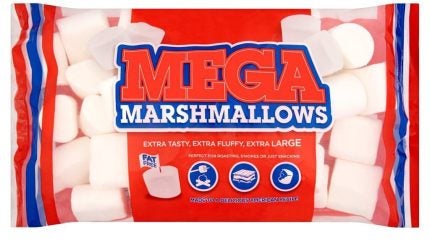
Innovative Bites has come out trumps in a tax case as a UK court ruled its marshmallows are not subject to VAT.
HMRC, the government tax authority, had appealed a 2022 decision by the First Tier Tribunal (FTT) that judged the sweets maker did not have to pay a £472,928 ($588,005) demand for sales tax on its Mega Marshmallows brand.

Discover B2B Marketing That Performs
Combine business intelligence and editorial excellence to reach engaged professionals across 36 leading media platforms.
A court document read, ruling in favour of Innovative Bites: “The conclusion reached by the FTT was that Mega Marshmallows are not confectionery and that the supply is therefore zero-rated.
“The conclusion was based on the findings that Mega Marshmallows are sold and purchased as a product specifically for roasting. The FTT considered the marketing, the packaging, the size of the product, the positioning in supermarkets and the seasonal fluctuation in sales when reaching its findings.”
HMRC tried to tax the company, described as a “wholesaler of American sweets and treats”, because it considered Mega Marshmallows were “confectionery and ought to have been standard rated”.
The tax authority attempted to collect the £472,928 covering supplies of the product for the VAT periods between June 2015 and June 2019.

US Tariffs are shifting - will you react or anticipate?
Don’t let policy changes catch you off guard. Stay proactive with real-time data and expert analysis.
By GlobalDataIn the UK, 20% VAT is paid on confectionery, defined as “sweetened prepared food which is normally eaten with the fingers”. The tax authority argued that the description applied to the Innovative Bites marshmallows.
Charlotte Brown, solicitor for the HMRC said that even if a certain product does not fall under the confectionery category, “within the ordinary, everyday usage of that word”, it might still fall within the “sweetened prepared food which is normally eaten with the fingers”.
Brown added that FTT has made a mistake in not giving “particular weight to the means of eating”, as that is “fundamental” in deciding what food category a product belongs to.
According to Brown, the key flaw in FTT’s reasoning was it said “the fact that Mega Marshmallows could be roasted meant they were no longer confectionery”. She added: “This was an error of law.”
Brown said there is “no case law to suggest that simply heating a confectionery product changes its fundamental characteristics as confectionery”. She argued that the Mega Marshmallows are not combined with other products to make it an ingredient.
However, Tim Brown, an appointed counsel for the London-headquartered sweets company, drew a comparison with “cooking chocolate and tiny marshmallows”.
He said that “whilst they are confectionery” they are untaxed by this concession as they are “ingredients used in cooking”.
The judge’s final ruling validated the original decision of the FTT, which said: “In the circumstances of this product, we do not give particular weight to the means of eating.
“Clearly, if the product is not roasted, then it will be eaten with the fingers, perhaps having been cut up for children under six. However, once roasted and cooled, the product might be either eaten off the stick or with the fingers.”
The FTT also said: “Further, the size of the packaging and indeed the product itself do not suggest to us that it is intended to be eaten on the go, like a packet of sweets or a smaller packet of regular marshmallows or some mini marshmallow.”
The court also said it did not accept Brown’s submission that “roasting a marshmallow is ‘simply heating’ it”. The court added that roasting gives the products a different texture and flavour, and, that roasting larger marshmallows “gives a different result in terms of the ratio of crisp outer to soft inner mallow”.





